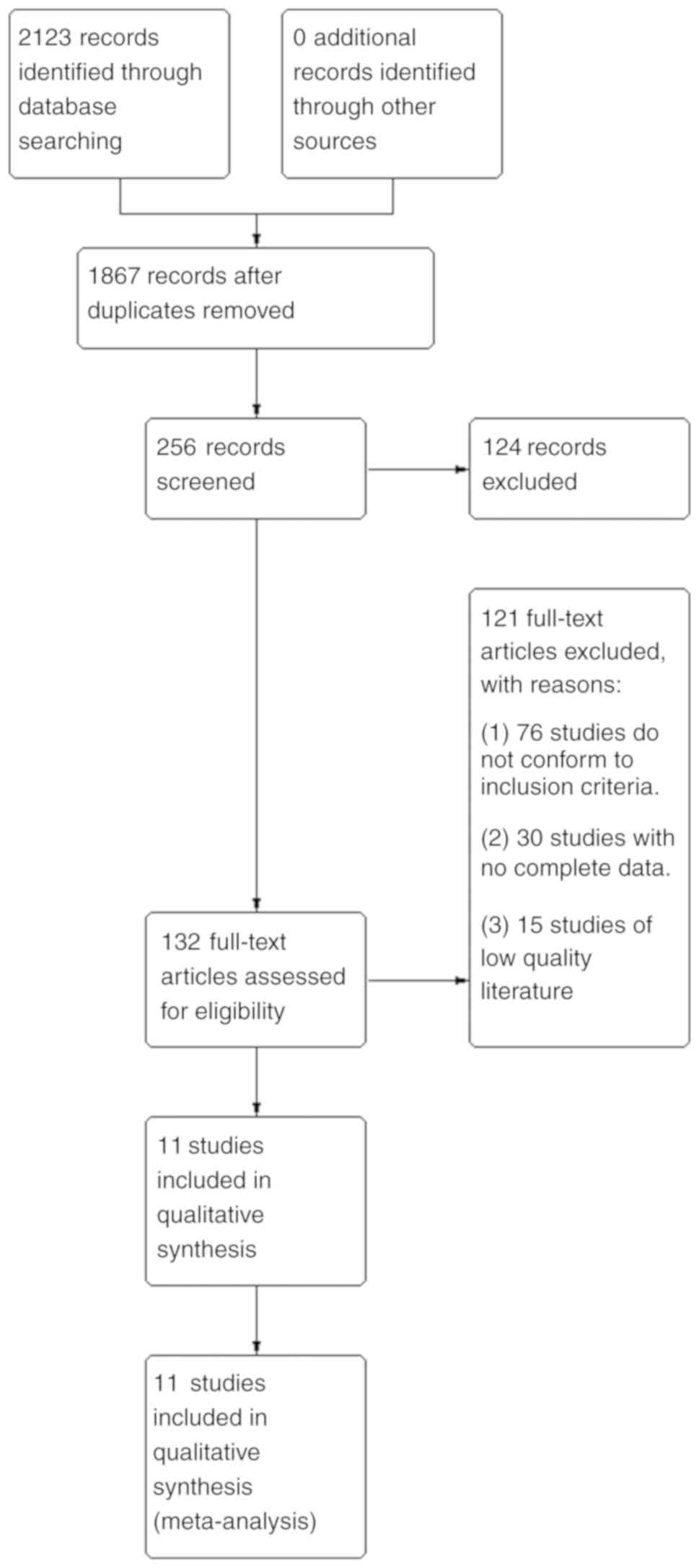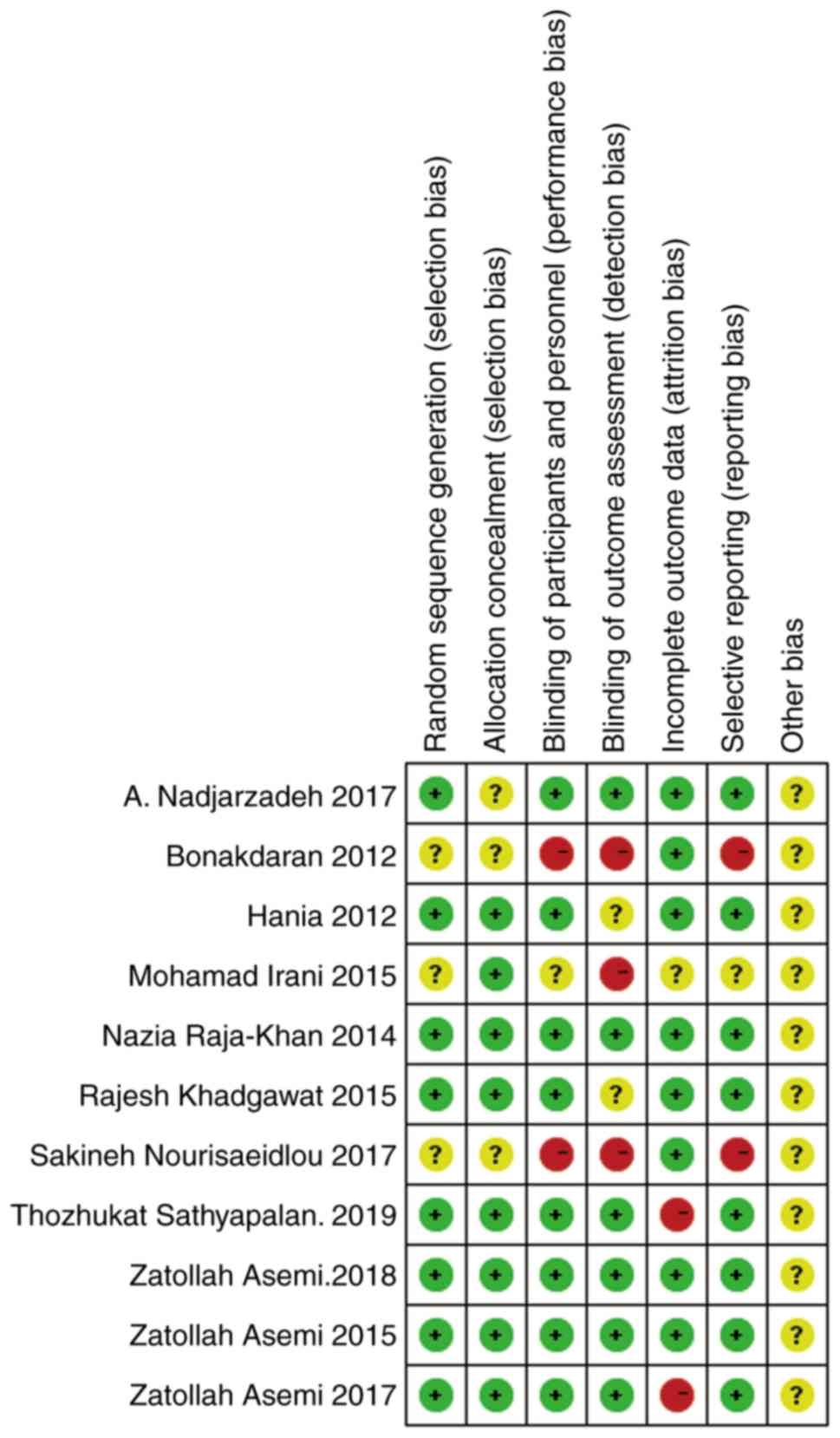|
1
|
Bozdag G, Mumusoglu S, Zengin D, Karabulut
E and Yildiz BO: The prevalence and phenotypic features of
polycystic ovary syndrome: A systematic review and meta-analysis.
Hum Reprod. 31:2841–2855. 2016.PubMed/NCBI View Article : Google Scholar
|
|
2
|
Rotterdam ESHRE/ASRM-Sponsored PCOS
Consensus Workshop Group. Revised 2003 consensus on diagnostic
criteria and long-term health risks related to polycystic ovary
syndrome (pcos). Hum Reprod 19: 41-47, 2004.
|
|
3
|
Jin P and Xie Y: Treatment strategies for
women with polycystic ovary syndrome. Gynecol Endocrinol.
34:272–277. 2018.PubMed/NCBI View Article : Google Scholar
|
|
4
|
Wild RA, Rizzo M, Clifton S and Carmina E:
Lipid levels in polycystic ovary syndrome: Systematic review and
meta-analysis. Fertil Steril. 95:1073–1079. 2011.PubMed/NCBI View Article : Google Scholar
|
|
5
|
Thomson RL, Spedding S and Buckley JD:
Vitamin D in the aetiology and management of polycystic ovary
syndrome. Clin Endocrinol (Oxf). 77:343–350. 2012.PubMed/NCBI View Article : Google Scholar
|
|
6
|
Mousa A, Naderpoor N, Teede HJ, De Courten
MP, Scragg R and De Courten B: Vitamin D and cardiometabolic risk
factors and diseases. Minerva Endocrinol. 40:213–230.
2015.PubMed/NCBI
|
|
7
|
Trummer C, Pilz S, Schwetz V,
Obermayer-Pietsch B and Lerchbaum E: Vitamin D, PCOS and androgens
in men: A systematic review. Endocr Connect. 7:R95–R113.
2018.PubMed/NCBI View Article : Google Scholar
|
|
8
|
Holick MF: Vitamin D deficiency. N Engl J
Med. 357:266–281. 2007.PubMed/NCBI View Article : Google Scholar
|
|
9
|
Gatti D, Idolazzi L and Fassio A: Vitamin
D: Not just bone, but also immunity. Minerva Med. 107:452–460.
2016.PubMed/NCBI
|
|
10
|
Jørgensen L, Paludan-Müller AS, Laursen
DR, Savović J, Boutron I, Sterne JA, Higgins JP and Hróbjartsson A:
Evaluation of the Cochrane tool for assessing risk of bias in
randomized clinical trials: Overview of published comments and
analysis of user practice in cochrane and non-cochrane reviews.
Syst Rev. 5(80)2016.PubMed/NCBI View Article : Google Scholar
|
|
11
|
Katz A, Nambi SS, Mather K, Baron AD,
Follmann DA, Sullivan G and Quon MJ: Quantitative insulin
sensitivity check index: A simple, accurate method for assessing
insulin sensitivity in humans. J Clin Endocrinol Metab.
85:2402–2410. 2000.PubMed/NCBI View Article : Google Scholar
|
|
12
|
Rössner SM, Neovius M, Mattsson A, Marcus
C and Norgren S: HOMA-IR and QUICKI Decide on a general standard
instead of making further comparisons. Acta Paediatr. 99:1735–1740.
2010.PubMed/NCBI View Article : Google Scholar
|
|
13
|
Javed Z, Papageorgiou M, Deshmukh H,
Kilpatrick ES, Mann V, Corless L, Abouda G, Rigby AS, Atkin SL and
Sathyapalan T: A randomized, controlled trial of vitamin D
supplementation on cardiovascular risk factors, hormones, and liver
markers in women with polycystic ovary syndrome. Nutrients.
11(E188)2019.PubMed/NCBI View Article : Google Scholar
|
|
14
|
Selimoglu H, Duran C, Kiyici S, Ersoy C,
Guclu M, Ozkaya G, Tuncel E, Erturk E and Imamoglu S: The effect of
vitamin D replacement therapy on insulin resistance and androgen
levels in women with polycystic ovary syndrome. J Endocrinol
Invest. 33:234–238. 2010.PubMed/NCBI View Article : Google Scholar
|
|
15
|
Łagowska K, Bajerska J and Jamka M: The
role of vitamin D oral supplementation in insulin resistance in
women with polycystic ovary syndrome: A systematic review and
meta-analysis of randomized controlled trials. Nutrients.
10(E1637)2018.PubMed/NCBI View Article : Google Scholar
|
|
16
|
Hu Z, Chen J, Sun X, Wang L and Wang A:
Efficacy of vitamin D supplementation on glycemic control in type 2
diabetes patients: A meta-analysis of interventional studies.
Medicine (Baltimore). 98(e14970)2019.PubMed/NCBI View Article : Google Scholar
|
|
17
|
Wehr E, Pieber TR and Obermayer-Pietsch B:
Effect of vitamin D3 treatment on glucose metabolism and menstrual
frequency in polycystic ovary syndrome women: A pilot study. J
Endocrinol Invest. 34:757–763. 2011.PubMed/NCBI View
Article : Google Scholar
|
|
18
|
Azadi-Yazdi M, Nadjarzadeh A,
Khosravi-Boroujeni H and Salehi-Abargouei A: The effect of vitamin
D supplementation on the androgenic profile in patients with
polycystic ovary syndrome: A systematic review and meta-analysis of
clinical trials. Horm Metab Res. 49:174–179. 2017.PubMed/NCBI View Article : Google Scholar
|
|
19
|
Cetkovic N, Pellicano R, Bjelica A and
Abenavoli L: Polycystic ovary syndrome and vitamin D serum levels.
Minerva Endocrinol. 44:82–84. 2019.
|
|
20
|
Dargham SR, Ahmed L, Kilpatrick ES and
Atkin SL: The prevalence and metabolic characteristics of
polycystic ovary syndrome in the Qatari population. PLoS One.
12(e0181467)2017.PubMed/NCBI View Article : Google Scholar
|
|
21
|
Pugeat M, Crave J, Tourniaire J and Forest
M: Clinical utility of sex hormone-binding globulin measurement.
Horm Res. 45:148–155. 1996.PubMed/NCBI View Article : Google Scholar
|
|
22
|
Hoseini R, Damirchi A and Babaei P:
Vitamin D increases PPARγ expression and promotes beneficial
effects of physical activity in metabolic syndrome. Nutrition.
36:54–59. 2017.PubMed/NCBI View Article : Google Scholar
|
|
23
|
Pludowski P, Holick MF, Pilz S, Wagner CL,
Hollis BW, Grant WB, Shoenfeld Y, Lerchbaum E, Llewellyn DJ,
Kienreich K and Soni M: Vitamin D effects on musculoskeletal
health, immunity, autoimmunity, cardiovascular disease, cancer,
fertility, pregnancy, dementia and mortality-a review of recent
evidence. Autoimmun Rev. 12:976–989. 2013.PubMed/NCBI View Article : Google Scholar
|
|
24
|
Fang F, Ni K, Cai Y, Shang J, Zhang X and
Xiong C: Effect of vitamin D supplementation on polycystic ovary
syndrome: A systematic review and meta-analysis of randomized
controlled trials. Complement Ther Clin Pract. 26:53–60.
2017.PubMed/NCBI View Article : Google Scholar
|
|
25
|
Jafari-Sfidvajani S, Ahangari R, Hozoori
M, Mozaffari-Khosravi H, Fallahzadeh H and Nadjarzadeh A: The
effect of vitamin D supplementation in combination with low-calorie
diet on anthropometric indices and androgen hormones in women with
polycystic ovary syndrome: A double-blind, randomized,
placebo-controlled trial. J Endocrinol Invest. 41:597–607.
2018.PubMed/NCBI View Article : Google Scholar
|
|
26
|
Seyyed Abootorabi M, Ayremlou P,
Behroozi-Lak T and Nourisaeidlou S: The effect of vitamin D
supplementation on insulin resistance, visceral fat and adiponectin
in vitamin D deficient women with polycystic ovary syndrome: A
randomized placebo-controlled trial. Gynecol Endocrinol.
34:489–494. 2018.PubMed/NCBI View Article : Google Scholar
|
|
27
|
Maktabi M, Chamani M and Asemi Z: The
effects of vitamin D supplementation on metabolic status of
patients with polycystic ovary syndrome: A randomized,
double-blind, placebo-controlled trial. Horm Metab Res. 49:493–498.
2017.PubMed/NCBI View Article : Google Scholar
|
|
28
|
Ardabili HR, Gargari BP and Farzadi L:
Vitamin D supplementation has no effect on insulin resistance
assessment in women with polycystic ovary syndrome and vitamin D
deficiency. Nutr Res. 32:195–201. 2012.PubMed/NCBI View Article : Google Scholar
|
|
29
|
Raja-Khan N, Shah J, Stetter CM, Lott ME,
Kunselman AR, Dodson WC and Legro RS: High-dose vitamin D
supplementation and measures of insulin sensitivity in polycystic
ovary syndrome: A randomized, controlled pilot trial. Fertil
Steril. 101:1740–1746. 2014.PubMed/NCBI View Article : Google Scholar
|
|
30
|
Garg G, Kachhawa G, Ramot R, Khadgawat R,
Tandon N, Sreenivas V, Kriplani A and Gupta N: Effect of vitamin D
supplementation on insulin kinetics and cardiovascular risk factors
in polycystic ovarian syndrome: A pilot study. Endocr Connect.
4:108–116. 2015.PubMed/NCBI View Article : Google Scholar
|
|
31
|
Dastorani M, Aghadavod E, Mirhosseini N,
Foroozanfard F, Zadeh Modarres S, Amiri Siavashani M and Asemi Z:
The effects of vitamin D supplementation on metabolic profiles and
gene expression of insulin and lipid metabolism in infertile
polycystic ovary syndrome candidates for in vitro fertilization.
Reprod Biol Endocrinol. 16(94)2018.PubMed/NCBI View Article : Google Scholar
|
|
32
|
Irani M, Seifer DB, Grazi RV, Julka N,
Bhatt D, Kalgi B, Irani S, Tal O, Lambert-Messerlian G and Tal R:
Vitamin D supplementation decreases TGF-β1 bioavailability in PCOS:
A randomized placebo-controlled trial. J Clin Endocrinol Metab.
100:4307–4314. 2015.PubMed/NCBI View Article : Google Scholar
|
|
33
|
Foroozanfard F, Jamilian M, Bahmani F,
Talaee R, Talaee N, Hashemi T, Nasri K, Asemi Z and Esmaillzadeh A:
Calcium plus vitamin D supplementation influences biomarkers of
inflammation and oxidative stress in overweight and vitamin
D-deficient women with polycystic ovary syndrome: A randomized
double-blind placebo-controlled clinical trial. Clin Endocrinol
(Oxf). 83:888–894. 2015.PubMed/NCBI View Article : Google Scholar
|
|
34
|
Bonakdaran S, Mazloom Khorasani Z, Davachi
B and Mazloom Khorasani J: The effects of calcitriol on improvement
of insulin resistance, ovulation and comparison with metformin
therapy in PCOS patients: A randomized placebo-controlled clinical
trial. Iran J Reprod Med. 10:465–472. 2012.PubMed/NCBI
|

























